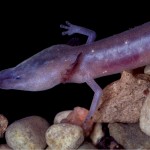Comptroller’s Endangered Species Duties Could Go to Wildlife Department

Photo courtesy of US Fish adn Wildlife Service
The Lesser Prairie Chicken was proposed for listing as "threatened" recently by the US Fish and Wildlife Service.
Comptroller Susan Combs, Texas’ top accountant and tax official, doesn’t just deal with money: she’s also in charge of monitoring endangered species.
It’s an odd coupling, money manager and critter caretaker, and a new piece of legislation could undo the two disparate duties. The Senate Natural Resources Committee discussed a bill, SB 468, at a meeting Tuesday that would send Texas’ endangered species monitoring duties over to the Texas Parks and Wildlife Department and create a fund to finance research.
State Sen. Kel Seliger, R-Amarillo, the author of the bill, said the transfer of duties should streamline the monitoring and research and save the state money, among other things.
“If we can get ahead of the science, maybe we can avoid more listings,” Seliger said.
Keeping Texas species off the endangered species list is a major goal of state government and businesses around the state, including the oil and gas industry.
Ben Shepperd, President of the Permian Basin Petroleum Association, testified in favor of the bill. He echoed Seliger’s desire to keep species off the endangered species. Recently in West Texas, the Dunes Sagebrush Lizard was nearly listed as endangered by the federal government. That would have had a negative affect on the oil drilling boom in West Texas and, by default, the state’s coffers.
How Did We Get Here?
Former state Rep. Warren Chisum, R-Pampa, tucked an amendment into a “fiscal matters” bill late in a 2011 special session that put the Comptroller in charge of endangered species issues in the state. (Read the Texas Tribune’s coverage of the issue here.)
There was no explanation of why the duties were moved from the Wildlife Department to the Comptroller. It wasn’t an independent bill, so there was never a hearing on the rationale, Seliger said of the amendment.
Shepperd, of the Permian Basin Petroleum Association, said he didn’t fight hard against the amendment in that 2011 special session.
“We didn’t understand, at that point, what the ramifications would be,” Shepperd said.
In addition to transferring duties to Parks & Wildlife, Seliger’s legislation would create a State Endangered Species Response Committee, composed of top officials from a variety of state agencies including the Attorney General’s Office, the Railroad Commission, Comptroller and the Texas Parks and Wildlife Department.
It would also establish a Habitat Protection Research Fund to help finance endangered species research. Monies for the fund would come from appropriations, donations and grants, among other places.
Seliger said transferring duties to the wildlife department would save the state cash, as the wildlife department already has biologists and endangered species experts on staff. The Comptroller’s office has to contract out that work, he said.
“While the Comptroller has the state’s economic interests at heart, she doesn’t have biologists,” Shepperd said.
State Sen. Troy Fraser, R-Horseshoe Bay, Chairman of the Senate Natural Resources Committee, said economic issues and endangered species go hand in hand.
During the construction of O.H. Ivie reservoir near San Angelo, the Concho River Snake was a case in point. All the snakes had to be captured and moved to another location. If endangered listings could be avoided through conservation plans, costly projects like that one would be avoided.
“I remember at the time saying it was about $154,000 per snake,” Fraser said. “We could have built a condominium for each one of the snakes.”

